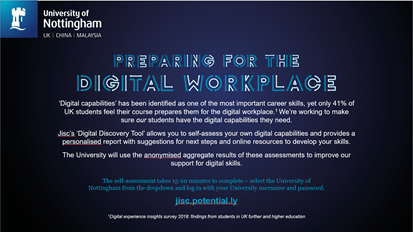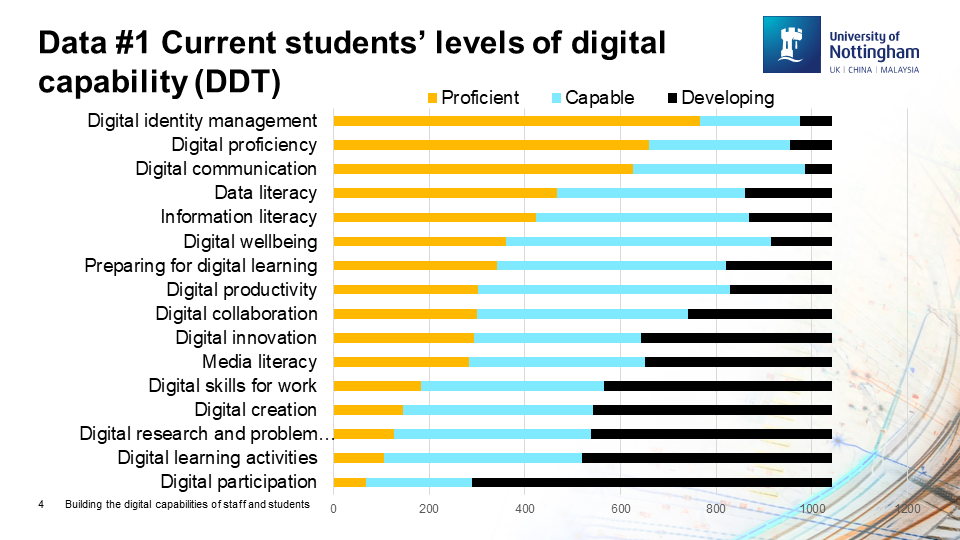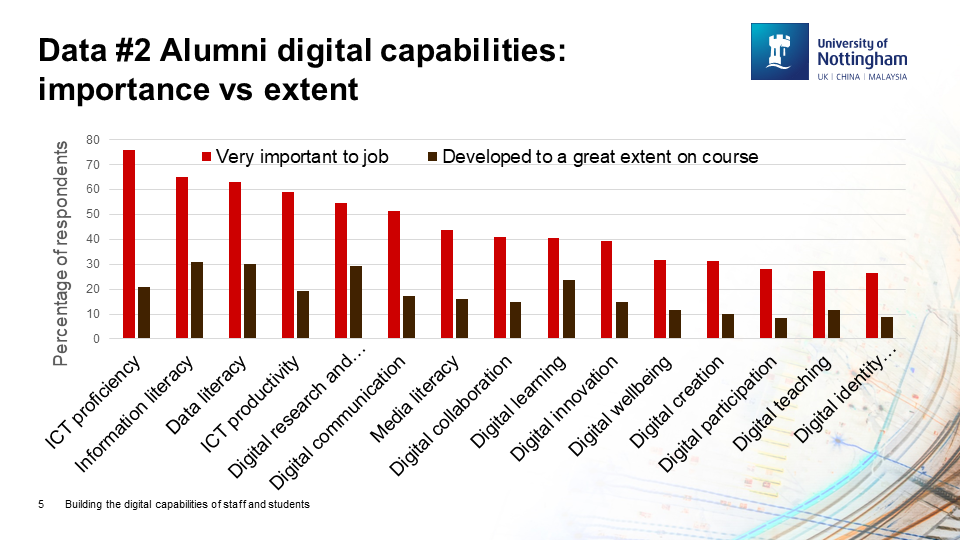University of Nottingham

Taking an evidence-based approach to educational enhancement is fundamental. The Jisc services have given me trust and confidence in our approach. We have benefitted from access to road-tested services developed with the sector and supported by ongoing review and community engagement.
Elizabeth Newall, senior librarian: digital literacy, University of Nottingham
Digital futures
The University of Nottingham is a global university. In addition to its UK campus, it has campuses in Malaysia and China. With gold status in the Teaching Excellence and Student Outcomes Framework (TEF), it is critical that educational enhancement work is evidence-driven.
The university has a digital futures programme spanning all aspects of provision (infrastructure, research, teaching and learning, and engagement). There are over 50 strategic projects under the umbrella term of ‘digital futures’, many of which relate to teaching and learning. The digital learning vision is people-centred, and focuses on pedagogy and culture, ahead of software and hardware.
One outcome from the digital futures programme has been the appointment of faculty digital learning directors (one or shared role per faculty). These roles are academic secondments and each of the five faculties also has a digital learning committee with digital learning representatives drawn from academic staff in each of their respective schools.
Other key drivers include the university’s educational enhancement and assurance reviews and the embedding of professional competencies in the curriculum, a project led by the careers and employability service. This resulted in the production of a handbook published in September 2018 in which digital capabilities were identified as one of four professional competencies that were to be embedded within the university’s curricula. All schools are required to provide evidence of how they are embedding these professional competencies in their annual educational enhancement plans.
Student digital capabilities – mind the gap!
The increasing focus on digital learning and the articulation of professional competencies in curricula necessitated further research into student digital capabilities.
With the creation of a new role - senior librarian for digital literacy - Elizabeth Newall was tasked with identifying gaps in the support for students in developing their digital capabilities and to make recommendations as to how these gaps may be addressed.
This work was funded by the university’s educational excellence programme and overseen by the university’s associate pro vice chancellor for teaching and learning.
Elizabeth designed and led a two-pronged research approach:
- Use of the building digital capability service and the discovery tool to ascertain the level of digital confidence and capability of current students
- Research into the digital skills that alumni used most frequently in their careers together with employer expectations of graduate digital capabilities
Engaging students with the discovery tool
Key partners and the roles they played in supporting the roll out of the discovery tool to students included:
- The pro vice chancellor for education emailed all heads of school to explain the rationale for using the tool and ensure they were able to help promote the opportunity via their teams
- The digital futures senior programme manager secured top level buy in by asking board members to personally complete the tool so they too were aware of the initiative and could promote it widely
- The internal communications team produced some university-wide publicity in both digital and print format. This included slides that could be dropped into slide decks and used by lecturers and professional services staff when directly interacting with students
- Some of the academic digital learning representatives generously carved out 15 minutes of time in their lectures to encourage large groups of students to complete the tool
- The university’s senior tutor invited Elizabeth to a senior tutors’ network meeting where agreement was sought to promote the discovery tool in personal tutorial meetings
- The Student Union education officer emailed 700 student reps in the education network to encourage participation
- Articles were also published in student and staff newsletters; posts were made via student social media channels and publicity uploaded to digital display screens across campus and on the virtual learning environment (VLE)

Engaging alumni in wider research
The campaign and alumni relations office was a key partner in reaching graduate alumni who had studied at the university during the previous five years.
The survey asked alumni about the digital tools they used most frequently in the workplace, the tools employers expected graduates to know how to use when they first started, what digital skills and experiences would have better prepared them for employment and what digital capabilities they thought they would need in the next five years. The digital capabilities framework helped alumni to understand the concepts and the terminology used.
Putting the data to work
1,200 students used the discovery tool in 2019 to self-assess and reflect on their digital capabilities (approximately a 5% response rate). The discovery tool’s data dashboard provided anonymised views of the spread of student confidence and capability across 16 areas of capability within the Jisc digital capability framework.
The aggregate data showed that while the students may have grown up with technology, they were not necessarily proficient in all digital capabilities. This is an important message, and one which the alumni research into what the term ‘the digital workplace’ means and which digital capabilities were most important there provided additional insight. Using the digital capabilities framework as a common language and reference point across the two pieces of research helped when comparing the two data sets.

Having aggregate institutional data via the data dashboards has been incredibly helpful in identifying trends in digital capability competencies and potential needs.
Elizabeth Newall, senior librarian: digital literacy, University of Nottingham
400 former students responded to the alumni survey with responses from a diverse range of job roles with representation from all five faculties. Having data literacy skills was identified as being of paramount importance with a focus on data analytics. Digital communication, creation, innovation and collaboration were also cited as key skills that alumni would need over the next five years.

Senior leaders across the University have hugely valued understanding the capabilities our students believe they have or need. Cross-checking this against the views of our alumni has really helped us to rethink our student support and our programme design.
Professor Sarah Speight, pro-vice chancellor for education and student experience, University of Nottingham
The findings from the discovery tool and alumni survey were reported to the faculty digital learning directors and individual schools using a consultative approach. This allowed for discussion to explore findings pertinent to their students, consider which digital capabilities their disciplines required, the support already available to their students and what they would like to see further prioritised or supported within their curricula.
Each of the 27 schools received a report specific to their discipline and, after consultative discussions, common themes were established across the faculties and a series of recommendations drafted for discussion with faculty digital learning directors. 15 recommendations relating directly to the development of student digital capabilities were endorsed by the university’s teaching and learning committee along with an additional recommendation (and 11 sub recommendations) that focused on staff digital skills development.
- Student digital capabilities recommendations related to new interventions within curricula, especially for first year students with a focus on cyber security, digital identity management, file management and use of O365.
- Later stage support was recommended in the form of a suite of sessions to support taught course students in using digital tools for research projects and dissertations.
- Other recommendations centred on wrap-around provision, principally through new modules in the Nottingham Advantage Award but also in supporting students to reflect and act on the personal reports generated from the digital discovery tool.
- Curriculum mapping and tracking school progress were also recommended.
The quality of support from the Jisc teams has been instrumental in delivering this work and provided a very positive, supportive and engaging environment. This has helped us to develop our own organisational approach with the economy of not having to ‘reinvent wheels’.
Elizabeth Newall, senior librarian: digital literacy, University of Nottingham
A new student digital capability steering group was formed in January 2020 to take the recommendations forward, agree priorities and oversee implementation. Membership of this group includes representation from the digital futures board, digital learning directors, Student Union and a range of senior leaders across professional services. A scoring matrix was developed to inform prioritisation.
Gaining additional insight
The university also used the Jisc digital experience insights service to seek additional information about the technologies students owned and had access to, their experience of technology at the university and on their course as well as the opportunities they had to develop their digital skills.
The surveys for students, teaching staff and professional services staff ran during February 2020. Again, the internal communications team produced design collateral and news items to staff and students signposting them to a web portal where more information was available. A dedicated working group played an active role in promoting the surveys, using peer channels to extend their reach. Communicating at a local level meant that the invitations to participate came from known and trusted sources and encouraged engagement.
In addition, digital student ambassadors publicised the surveys by holding pop up promotional events in areas like libraries, cafes, the Student Union and key teaching buildings where there was a heavy student footfall. Students were invited to complete the survey there and then, using their own devices or tablet devices loaned to the ambassadors.
Responses to the 2020 digital experience insights surveys exceeded the targets required to achieve institutional confidence in the data: 2,648 student responses (confidence required 380), 461 responses from teaching staff (required 335) and 867 responses from professional services staff (285 required).
Benchmarking is vital within the current metrics environment – there is a strong appetite to know how your institution compares.
Elizabeth Newall, senior librarian: digital literacy, University of Nottingham
Because there are potentially so many stakeholders with an interest in the digital experience insights surveys, a large working group has been formed comprising 40+ members drawn from across the university. Membership includes:
- Education and student experience managers
- All faculty digital learning directors
- Senior programme manager for digital futures
- The director of professional development
- Student union representatives
- The library and learning technologies
- Information services
- Academics from the school of education
- Representatives from internal communications team
- Careers and employability service
- Disability support and student services
The group steers the implementation of the surveys, promotes engagement and will support action based on recommendations from the data generated.
Next steps – digital capabilities at the heart
COVID-19 has meant a focus on digital teaching and learning, but the needs of students on entering the digital workplace are unlikely to have changed. Students therefore need to develop a broad range of digital capabilities and the discovery tool is fundamental to this.
Elizabeth Newall, senior librarian: digital literacy, University of Nottingham
The COVID-19 pandemic required an immediate change in emphasis as the university instigated a dramatic and wholesale shift to digital teaching and learning in March, and in preparing to welcome students to campus in September for a more blended approach:
- Each faculty has submitted a teaching and assessment plan for 2020/21. An education and student experience working group comprising professional services staff will provide central support for the faculties as they deliver these plans
- The faculty digital learning directors have created a pedagogic framework to guide the design of training materials to support staff to deliver asynchronous and synchronous learning activities
- The student digital capability steering group is drafting a corresponding framework to provide a series of overarching principles for resources, wrap around support and training. These will take account of findings and data from the use of the discovery tool and the digital experience insights surveys
- Student use of the discovery tool is at the forefront of a new set of resources to support the digital experience of new and returning students in September, and its embedded use in the curriculum continues to be advocated to ensure students have the chance to self-assess and discuss their digital skills at key stages throughout their university journey
The next phase of planned work, and a detailed analysis of the 2020 digital experience insights survey findings is being presented to the teaching and learning committee, digital futures programme board and digital strategy committee during the summer months. It will provide a valuable baseline to compare and contrast with a planned rerun of the insights surveys during the 2020/21 academic year.
Prioritisation of work informed by data from the discovery tool, the alumni survey and digital experience insights is in progress. Work streams will commence in autumn 2020 with the expectation that new provision will be introduced over the next two-to-three years.
The Jisc data informed our thinking pre COVID-19. Post-COVID, it has reinforced the importance of student digital capabilities but, in a time of hard choices, is helping us to prioritise both efficiently and effectively.
Professor Sarah Speight, pro-vice chancellor for education and student experience, University of Nottingham
An alumni graduate who took part in the survey now sits as a member of the student digital capability steering group (a subcommittee of the teaching and learning committee).
The University of Nottingham is conducting its own survey to explore the wider experience of students during COVID-19 (eg motivation, the extent to which students have been able to focus on their studies alongside other responsibilities, mental wellbeing, study location). The survey has attracted over 5,000 responses and this data will also be used to shape the delivery model for the new academic year.
Tips for others and lessons learnt
- Having data has led to more meaningful, focused and balanced conversations. In turn, this has secured prompt support to progress the student digital capability agenda
- The support from the senior leaders and the student union ensured everyone was aware of the purpose of the initiative and helped to achieve valuable buy-in and engagement
- The involvement of the internal communications team in designing and conveying key messages that could then be relayed at a local level by members of the working group helped to reach and engage large numbers of students
- The broad infrastructure and range of stakeholders involved in digital developments across the university has required a partnership approach and work with a wide range of academic and professional services staff as well as student representatives. Adopting a university wide methodology has taken a lot of time and effort but the consultative approach and partnership work is having an impact. Making time to meet with individuals has been important
A fundamental aspect of the brief was to take an evidence-based approach to educational enhancement – that is what the Jisc services have enabled me to do.
Elizabeth Newall, senior librarian: digital literacy, University of Nottingham
You may also be interested in:
- A presentation co-presented by Elizabeth at Digifest (March 2020)
- A presentation by Elizabeth and Richard Windle at Connect More on student digital capabilities and institutional strategy before, during and after COVID-19 (June 2020)